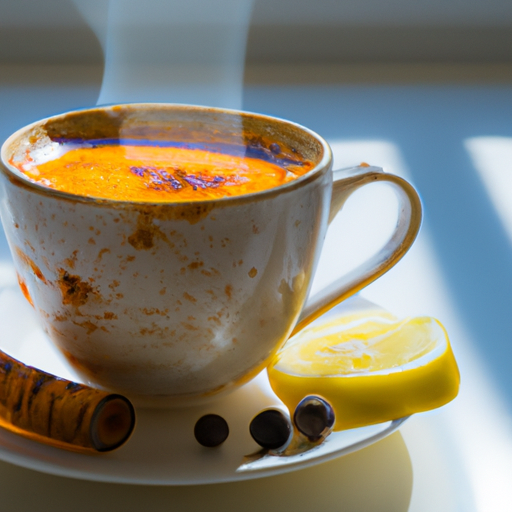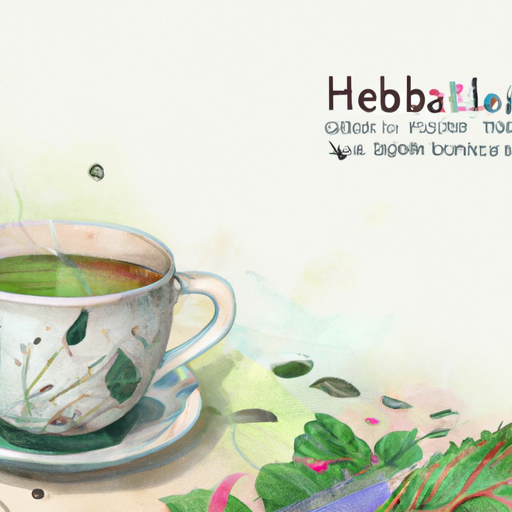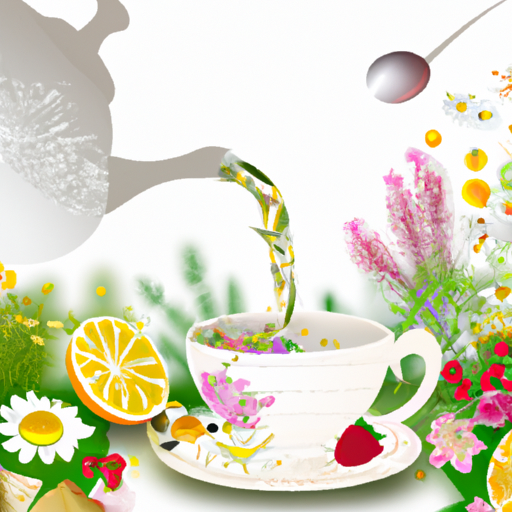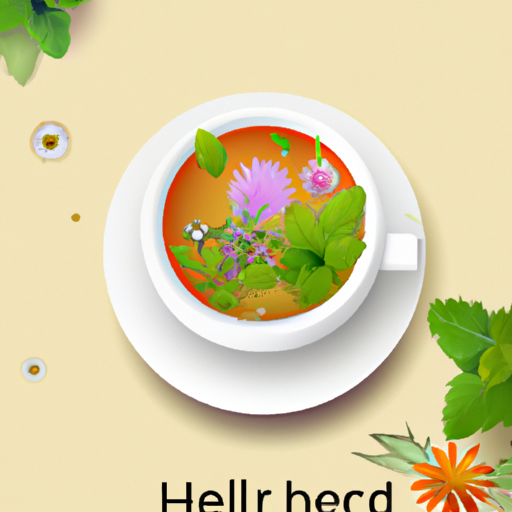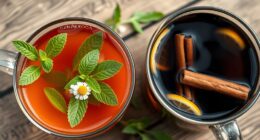Have you ever wondered how to achieve that perfect cup of herbal tea? The key lies in the art of steeping.
Steeping is the process of extracting the flavors, aromas, and beneficial properties from tea leaves or herbs by immersing them in hot water. And believe me, getting the timing right is crucial.
Picture this: you pour boiling water over a fragrant chamomile tea bag, eagerly anticipating that soothing sip. But if you remove the tea bag too soon, you’ll miss out on the full-bodied flavor and potential health benefits. On the other hand, leaving it in for too long can result in a bitter, overpowering taste.
In this article, I will guide you through the perfect steeping times for various herbal teas, including chamomile, peppermint, green tea, rooibos, hibiscus, ginger, and lavender. Get ready to brew the most delicious and invigorating cup of herbal tea you’ve ever tasted!
Key Takeaways
- Different types of herbal tea have different recommended steeping times, ranging from 2-10 minutes.
- Timing is crucial for achieving the perfect cup of herbal tea, as it allows flavors and aromas to infuse into the water.
- Longer steeping times can enhance taste, aroma, and health benefits, but oversteeping should be avoided to prevent a bitter taste.
- Water temperature also plays a crucial role, with lower temperatures for delicate herbal teas and higher temperatures for robust ones.
Chamomile Tea
You’ll want to steep your chamomile tea for about five to seven minutes to get the perfect balance of flavors and aromas. Chamomile tea isn’t just delicious, but it also offers a range of health benefits. It’s known for its calming properties and is often consumed before bed to help promote a good night’s sleep.
Chamomile tea is also believed to aid digestion and soothe an upset stomach. When brewing chamomile tea, it’s important to use hot water that’s around 200°F. This temperature allows the chamomile flowers to release their essential oils and flavors. Simply place a chamomile tea bag or a teaspoon of loose chamomile flowers in a cup, pour hot water over it, and let it steep for five to seven minutes. You can adjust the steeping time to your preference, but be careful not to oversteep, as it can result in a bitter taste.
Transitioning into the subsequent section about peppermint tea, it’s important to note that different herbal teas have different steeping times. Peppermint tea, for example, requires a shorter steeping time of about three to five minutes.
Peppermint Tea
When it comes to enjoying a refreshing cup of peppermint tea, steeping for 3-5 minutes is key to unlocking its invigorating flavor. Steeping for too long can result in a bitter taste, so it’s important to avoid oversteeping.
As someone who appreciates a perfectly brewed cup of tea, I find that following these steeping guidelines ensures a delightful and satisfying experience.
Steep for 3-5 minutes for a refreshing and invigorating flavor
For a refreshing and invigorating flavor, steep your herbal tea for 3-5 minutes. This will result in a delightful and revitalizing brew. Herbal tea has numerous benefits, making it an excellent beverage choice for health-conscious individuals. It’s packed with antioxidants that help boost the immune system and promote overall well-being.
Additionally, different types of herbal tea offer unique flavors and potential health benefits. For example, chamomile tea is known for its calming properties, while ginger tea can aid in digestion. However, it’s important to avoid steeping herbal tea for too long as it can become bitter. Oversteeping can release tannins and other compounds that may overpower the delicate flavors of the herbs.
So, be mindful of the steeping time to ensure a perfect cup of herbal tea every time.
Avoid steeping for too long as it can become bitter
To avoid a bitter brew, be mindful of the steeping time when making your herbal tea. Herbal teas are delicate and can quickly become bitter if steeped for too long. The optimal steeping time for herbal tea is typically between 3 to 5 minutes. This allows the flavors to fully infuse into the water, resulting in a refreshing and invigorating beverage.
However, it’s important to note that steeping for longer than the recommended time can lead to a bitter taste. The flavors can become overpowering and the tea may lose its desired qualities. So, be sure to set a timer and remove the tea bag or strain the loose leaves promptly.
Now, let’s move on to the next topic and explore the perfect steeping time for green tea.
Green Tea
When it comes to brewing green tea, it’s important to keep a close eye on the steeping time. I recommend steeping the tea for 2-3 minutes for a light and delicate flavor. However, don’t oversteep, as this can result in a bitter taste.
Steep for 2-3 minutes for a light and delicate flavor
Steep herbal tea for 2-3 minutes to achieve a light and delicate flavor, creating a soothing infusion that’s perfect for relaxation. Herbal tea offers a range of benefits, from promoting relaxation to providing antioxidants. There are various types of herbal tea, each with its own unique properties and flavors. To enhance your tea-drinking experience, I’ve prepared a table below highlighting some popular types of herbal tea and their benefits:
| Type of Herbal Tea | Benefits |
|---|---|
| Chamomile | Promotes relaxation and aids in sleep |
| Peppermint | Soothes digestion and relieves headaches |
| Hibiscus | Supports heart health and lowers blood pressure |
| Ginger | Eases nausea and reduces inflammation |
| Rooibos | Rich in antioxidants and promotes radiant skin |
When steeping herbal tea, be careful not to oversteep as it can turn bitter. This can be avoided by following the recommended steeping time. Now, let’s delve into the next section and explore the art of tea brewing.
Be careful not to oversteep as it can turn bitter
Make sure you don’t steep your herbal tea for too long, as it can result in a bitter taste that may not be enjoyable. The importance of steeping time in herbal tea brewing can’t be overstated.
Steeping for the right amount of time allows the flavors and aromas of the herbs to infuse into the water, creating a delicious and balanced cup of tea. To achieve the perfect balance of flavor, it’s recommended to steep herbal tea for around 2-3 minutes. However, it’s essential to keep in mind that different herbal teas may require slightly longer or shorter steeping times. Experimentation is key to finding your preferred steeping time for different herbal teas.
Now, let’s move on to the delightful world of rooibos tea, a caffeine-free herbal tea that boasts numerous health benefits.
Rooibos Tea
When it comes to Rooibos tea, I find that steeping it for 5-7 minutes is the perfect amount of time to achieve a rich and earthy flavor. However, if you prefer a stronger taste, you can opt for a longer steeping time. By allowing the tea leaves to steep for an extended period, you can enhance the taste and bring out even more of the tea’s natural flavors.
Steep for 5-7 minutes for a rich and earthy flavor
For a truly satisfying cup of herbal tea, let it infuse for 5-7 minutes, allowing its rich and earthy flavors to develop. Herbal tea offers numerous benefits for overall health and well-being. It is not only a warm and comforting beverage but also a natural remedy for various ailments. When choosing the best herbal tea for your taste preferences, consider the specific benefits you are seeking. For example, chamomile tea is known for its calming properties, while peppermint tea aids digestion. To further enhance your tea experience, consider steeping it for a longer duration. This can intensify the taste and aroma, creating a more robust and flavorful cup. Experiment with different steeping times to find the perfect balance for your personal preference. Longer steeping can truly elevate the taste and enjoyment of your herbal tea.
Longer steeping can enhance the taste
After steeping herbal tea for 5-7 minutes, you can already enjoy a rich and earthy flavor. However, if you’re looking to take it a step further and enhance the taste even more, longer steeping times can be beneficial.
By allowing the herbs to steep for a longer period, the flavors have more time to infuse into the water, resulting in a more pronounced and robust taste. This is especially true for herbal teas that have stronger flavors, such as chamomile or peppermint.
Experimenting with steeping times can be a fun and rewarding experience, as you have the opportunity to discover the perfect balance of flavors that suits your palate.
Now, let’s delve into the world of hibiscus tea and explore its unique characteristics and steeping requirements.
Hibiscus Tea
Steeping hibiscus tea for around 5 minutes will infuse the water with its vibrant red color and tart flavors. Hibiscus tea, known for its numerous health benefits, is a popular herbal tea that’s enjoyed both for its taste and its potential medicinal properties.
This tea is packed with antioxidants, vitamin C, and minerals, making it a great addition to a healthy diet. Many people also enjoy hibiscus tea for its refreshing and tangy taste, which can be enhanced by longer steeping.
In addition to its health benefits, hibiscus tea can be used in various recipes to create delicious and unique beverages. One popular recipe is hibiscus iced tea, where the brewed hibiscus tea is chilled and served over ice, sometimes with a touch of sweetness or a splash of citrus juice. Another option is to mix hibiscus tea with other herbal teas, such as chamomile or mint, to create a soothing and flavorful blend.
Transitioning to the subsequent section about ginger tea, it’s worth noting that both hibiscus tea and ginger tea are widely enjoyed for their distinct flavors and potential health benefits. Ginger tea, known for its spicy and warming taste, has been used for centuries to aid digestion and relieve nausea.
Steeping ginger tea for around 10 minutes can extract its flavorful compounds and provide a soothing and invigorating beverage.
Ginger Tea
When it comes to making a bold and spicy Ginger Tea, steeping for 5-7 minutes is the key.
This allows the flavors to infuse into the water, creating a delicious and invigorating beverage.
However, if you prefer a stronger taste, you can opt for a longer steeping time to intensify the ginger flavor.
So, grab your favorite mug and get ready to enjoy a cup of aromatic and soothing Ginger Tea.
Steep for 5-7 minutes for a bold and spicy flavor
For a bold and spicy flavor, steep the herbal tea for 5-7 minutes. This will ensure that the tea leaves release their full potential, resulting in a rich and invigorating flavor. Here are three reasons why this steeping time is ideal:
-
Enhanced Aroma: Steeping the tea for 5-7 minutes allows the herbal infusion to develop a robust aroma that’ll awaken your senses.
-
Deep Flavor Profile: The longer steeping time extracts more of the tea’s natural oils and compounds, resulting in a bolder and more complex flavor.
-
Spicy Kick: Herbal teas, like ginger tea, can have a naturally spicy taste. Steeping for 5-7 minutes intensifies this spiciness, giving the tea an extra kick.
Remember, longer steeping can intensify the taste even further, but be cautious not to oversteep, as it may lead to a bitter aftertaste. So, for a truly bold and invigorating flavor, steep your herbal tea for 5-7 minutes, and longer if desired, to fully enjoy its aromatic and flavorful qualities.
Longer steeping can intensify the taste
After steeping herbal tea for 5-7 minutes to achieve a bold and spicy flavor, you might wonder what would happen if you steeped it for longer. Well, let me tell you, longer steeping can indeed intensify the taste of your tea.
The longer the herbs are immersed in hot water, the more their flavors are released, resulting in a more robust and aromatic cup of tea. Not only does longer steeping enhance the intensity of flavor, but it can also have a positive impact on the health benefits of herbal tea.
Steeping for a longer duration allows more of the beneficial compounds to be extracted, maximizing the nutritional value of your brew.
Now, let’s move on to the next section where we explore the wonderful world of lavender tea.
Lavender Tea
When it comes to brewing lavender tea, it’s important to steep it for just the right amount of time to achieve a soothing and floral flavor.
I recommend steeping the tea for 3-5 minutes, allowing the delicate flavors to infuse into the water. Be cautious not to steep it for too long, as this can lead to a bitter taste that overpowers the floral notes.
Steep for 3-5 minutes for a soothing and floral flavor
Steep the herbal tea for just a few minutes to unlock its soothing and floral flavor, creating a delightful and aromatic experience. Herbal teas, such as lavender tea, offer a range of benefits that make them a popular choice for beginners. For those looking to explore herbal tea options, it’s important to consider the best brands that cater to beginners. Additionally, drinking herbal tea before bed can promote relaxation and support a good night’s sleep. To help you visualize the steeping process, here is a table that outlines the recommended steeping times for different types of herbal teas:
| Herbal Tea Type | Steeping Time |
|---|---|
| Lavender | 3-5 minutes |
| Chamomile | 5-7 minutes |
| Peppermint | 3-4 minutes |
| Hibiscus | 7-10 minutes |
Remember, avoid steeping for too long as it can become bitter. This transition sets the stage for discussing the importance of timing when steeping herbal tea.
Avoid steeping for too long as it can become bitter
After enjoying a soothing and floral flavor by steeping your herbal tea for 3-5 minutes, it’s important to avoid leaving it for too long, as it can become bitter.
Now, let’s dive into the discussion about the impact of water temperature on herbal tea steeping time and different methods for optimal flavor extraction. The water temperature plays a crucial role in the steeping process.
For delicate herbal teas, such as chamomile or lavender, a lower temperature around 175°F (80°C) is recommended to prevent overpowering and bitterness. On the other hand, robust herbal teas like peppermint or ginger can handle higher temperatures around 200°F (93°C) for a more robust flavor.
Additionally, exploring different steeping methods, like using a tea infuser or a teapot with a built-in strainer, can enhance the flavor extraction process.
So, let’s brew our herbal tea with precision and enjoy its full potential.
Frequently Asked Questions
Can I adjust the steeping time for herbal teas based on my personal preference?
Yes, you can definitely adjust the steeping time for herbal teas based on your personal preference. It allows you to customize the flavor and strength of the tea according to your liking.
What are the potential health benefits of each type of herbal tea?
Potential health benefits of herbal teas vary by type. Chamomile may promote relaxation, peppermint aids digestion, and ginger can alleviate nausea. Steeping times for maximum benefits range from 5-10 minutes, but may vary based on personal preference.
Can I reuse the herbs for a second steeping?
Yes, you can reuse herbs for a second steeping. However, it’s important to adjust the steeping time because the flavors may not be as strong. Experiment with shorter steeping times to find your preferred taste.
Are there any specific precautions or contraindications for consuming certain herbal teas?
When it comes to consuming herbal teas, it’s important to be aware of any precautions or contraindications. Some teas may interact with medications or have side effects. Consult with a healthcare professional for personalized advice.
Can I combine different types of herbal teas when steeping for a unique flavor profile?
Yes, you can combine different types of herbal teas when steeping to create a unique flavor profile. Experimenting with steeping times allows for a personalized taste experience tailored to your preferences.
Conclusion
In conclusion, steeping herbal tea is a delicate art that requires both precision and patience. Just like a gentle breeze caressing a field of wildflowers, each type of herbal tea requires a specific amount of time to release its enchanting flavors and soothing properties.
Whether it’s the calming chamomile, the refreshing peppermint, or the invigorating ginger, the steeping process unveils a symphony of aromas and tastes that transport you to a state of tranquility.
So, take a moment to savor the essence of nature in every sip of herbal tea, and let its magic wash over you.


